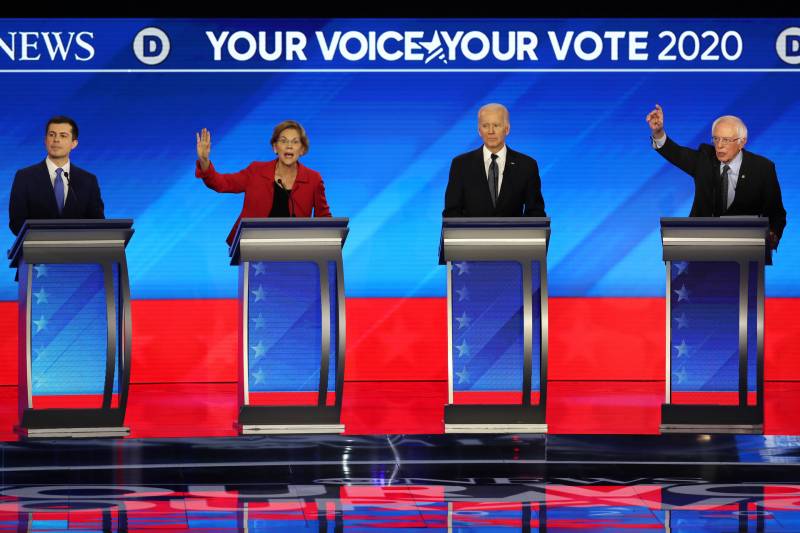Originally published Feb. 18, 2020
California Democrats will go to the polls on March 3 to select a candidate to be the party’s nominee against President Donald Trump in November.

Originally published Feb. 18, 2020
California Democrats will go to the polls on March 3 to select a candidate to be the party’s nominee against President Donald Trump in November.
Top of mind for many is our warming planet.
In a December 2019 Berkeley Institute of Governmental Studies poll of likely Democratic voters, almost half named climate change as their highest priority for the next president, more than on any other issue.
Last July, a Public Policy Institute of California poll found a record number of Californians — 71% — “very concerned” about wildfires becoming more severe because of global warming.
Climate change has “gone from being a nonissue for voters to being one of the top one or two issues,” said Marianne Lavelle, a reporter with the Pulitzer Prize-winning site InsideClimate News.
Lavelle and her colleagues spent months crafting detailed climate profiles of the leading contenders for the Democratic nomination. She also wrote an expansive analysis of President Donald Trump’s environmental record in office.
“Although Trump occasionally feigns concern about climate — ‘I think about it all the time,’ he once said — his policy has been an unmitigated and relentless drive toward fossil energy development,” Lavelle wrote.
KQED’s Raquel Maria Dillon interviewed Lavelle and ICN reporter Georgina Gustin on where the candidates stand on climate policy. Below are excerpts from their answers, edited for length and clarity. Some key points …
Climate is a huge issue this election
Gustin: We know that, at least in Iowa and New Hampshire, climate change ranked second only to health care in surveys of likely voters. That is likely because people are seeing the impacts of climate change all around them — in California, obviously, the devastating wildfires these last couple of years, and the historic flooding across the Midwest this past year. In New England, wildlife levels are dropping. Everybody sees this in their backyards and in their lives.
Democratic candidates agree on key policies
Lavelle: All of the Democrats agree on getting to zero new greenhouse gas emissions by midcentury, and that’s very significant because it’s in line with the science. They all agree on getting back in the Paris Accord. They all say they won’t take money from the fossil fuel industry. And each of them has embraced elements of the Green New Deal.
Disagreements on fracking and continued use of fossil fuels
Gustin: Amy Klobuchar, Joe Biden and Pete Buttigieg have all said that they are open to fracking, and they have said that they would continue exporting fossil fuels. Mike Bloomberg hasn’t addressed fracking. We’re not really sure where he stands. Elizabeth Warren and Bernie Sanders are out in front from a climate hawk standpoint: They would ban fracking and, to varying degrees, continued use of fossil fuels.
Candidates talking about their experience
Lavelle: Warren’s plan includes a fossil fuel industry disclosure of risks, and that makes it unique. Bloomberg worked with the Sierra Club for years on the “Beyond Coal” campaign to shut down coal-fired power plants. His plan is to do that on a federal level. He talks a lot about resilience, and, of course, as mayor of New York City, he had to deal with Superstorm Sandy and the after effects. Biden talks about his diplomatic experience, and how he was active in the Paris climate talks.
Trump: All about fossil fuels
Lavelle: Donald Trump is ignoring climate change and doing all he can to promote fossil fuels, including opening up fracking on a million acres in California.
Gustin: This administration has tried to, or is in the process of dismantling, every major piece of climate legislation enacted by the Obama administration, including the Clean Power Plan and fuel economy standards, which were major accomplishments.
The filibuster and its 60-vote requirement to pass legislation is a big stumbling block
Lavelle: Just this past year, Congress couldn’t even pass a very small investment in renewable energy. And no matter who wins the Senate, it’s going to be a closely divided Congress. The candidates will have to work with the other party.
Different constituencies divided on approaches and emphasis
Lavelle: Young people look at someone like Biden, who stresses his experience, and they say, ‘So what?’ They don’t see that he accomplished anything with the Obama administration. They don’t see that a lot of work went into environmental policy that went even that far.
Gustin: Rural voters who are typically very conservative and support Trump appreciate that the candidates include agriculture in their climate and rural plans. All of the candidates have agriculture proposals. Four or eight years ago, climate wasn’t an issue at all. To have candidates get into the weeds on an issue like soil carbon —which Biden and Buttigieg are semi-conversant in — is a remarkable change in the political conversation.
Lavelle: Voters are divided on the approach that they want. Buttigieg and Sanders are sucking all the oxygen out of the room. Sanders has taken the mantle of the Green New Deal. Buttigieg seems to be the choice of people who want something more pragmatic. He garnered the largest percentage of people who place climate as their number one issue in New Hampshire.

To learn more about how we use your information, please read our privacy policy.